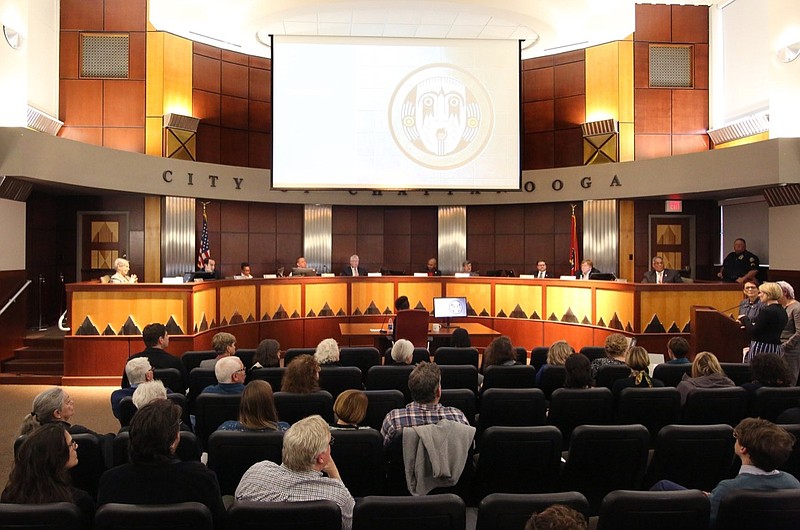Some recent Chattanooga City Council meetings have gotten heated as the council and some citizens clashed over public comment protocol.
For several consecutive weeks, there have been public comments made out of decorum, primarily related to the controversial proposed Business Improvement District.
Chairman and District 7 Councilman Erskine Oglesby is responsible for opening and regulating public comment sessions, resulting in a host of recent disputes with speakers who have acted outside of the rules read before each session.
"Every entity, government or not government, has rules and these are ours," Oglesby said. "It's not to inhibit anyone's freedom of speech. We set those rules to make sure everyone has ample time to express their views and to make sure no one person takes over the meeting."
Under the council's code, there will be a chance for public comment at the end of every business meeting, every Tuesday at 6 p.m., but speakers must adhere to the following rules:
» Each speaker wishing to address the council will be recognized only at the microphone provided for that purpose.
» No person will have more than three minutes to speak.
» The speaker can address the council only on matters within the legislative and quasi-judicial authority of the council.
» The speaker will not be permitted to use any vulgar or obscene language, nor use the floor to personally attack or personally denigrate others.
» The chairperson will not recognize any person, neighborhood association or organization to speak to the council during the "non-agenda matters" portion of the agenda more than twice in any 30-day period.
» Those wishing to address the council can do so only once during a council day, either at the agenda session, at a committee meeting or at the council business meeting.
Lately, the stipulation that agenda items may not be discussed has been the most contentious.
At a meeting in late June, Blake Wright, an investor in a business within the area of the proposed business improvement district who recently filed an ethics complaint against the city regarding it, tried to speak about business improvement districts as a concept and was told her comments violated the public comment rules. Those rules limit comments to non-agenda items.
Wright and Oglesby, who sponsored the second BID resolution after the original ordinance failed and was named in Wright's ethics complaint, sparred about whether the rule applied until Wright left the podium, accusing Oglesby of "silencing [her] voice."
Wright was defended by another community member, Rick Carpenter, who said the rules were unclear.
"You're going to have to start explaining things to [those speaking at public meetings]," Carpenter said. "One thing I'd like to have the city attorney do is get a definition ready and let us know what dictionary you're operating out of. These meanings vary widely."
"Something either is or is not related," Oglesby clarified this week. "There is no quasi-related."
The irregularity of the business improvement district formation process also caused public comment issues when it was first heard and failed.
Since such districts are formed under state law, the council legally has to follow state procedure for public hearings on the matter, which includes only allowing those who are property owners in the affected area to participate in the official public hearing.
Anyone, including non-property owners, is allowed to speak about the district at any meeting when it is not on the agenda. According to Oglesby, while citizens are regulated at the meetings, there is no limit or protocol on providing feedback to council members outside of meetings.
"It's very important to us to hear what their concerns are, and we value their concerns and will continue to do so, " Oglesby said. "The thing is that we as a council are open to hear what they have to say not only at the public meeting but in between as well, by phone or email or whatever means."
The business improvement district will be on the July 23 and the July 30 agendas and cannot be discussed in public comments at either meeting except by property owners (within the proposed district) during the public hearing at 6 p.m. on July 30.
Contact information for each council member can be found at chattanooga.gov/city-council/council-members.
Contact Sarah Grace Taylor at staylor@timesfreepress.com or 423-757-6416. Follow her on Twitter @sarahgtaylor.
